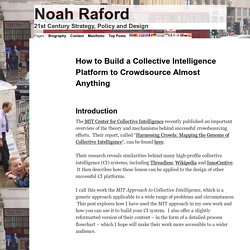

Defining “Collective Intelligence” Collectivism on the Web. Collectivism emphasizes on human interdependence and the importance of collective. As probably the greatest collective project of mankind in history, World Wide Web engages enormous practices of collectivism. In this article, we take a brief look at several typical examples of these engagements.
Collective Intelligence Collective intelligence is the most well-known engagement of collectivism on World Wide Web. In particular, Web 2.0 advocates have declared "harnessing collective intelligence" to be the touchstone of the Web 2.0 revolution. A keen reader may immediately find an interesting comparison: are there any differences between user generated "intelligence" and user generated "content" (or user generated "data")? Content/data is a type of intelligence but at the low end. I foresee that the degree of complexity (as well as the degree of efficient usage) of the collective intelligence on the Web is going to evolve with the Web. Collective Behavior Collective Responsibility Summary. The Wisdom of Crowds.
Collective Intelligence. Collective Intelligence = "the capacity of a human community to evolve toward higher order complexity thought, problem-solving and integration through collaboration and innovation" (George Por URL = Towards the creation of a ommicentric Ideosphere: Kosmic Alignment.

A Principle of Global Unity. By Yasuhiko Genku Kimura. "We human beings are at our best not when we are engaged in abstract solitary reflection or on our individual transformation for its own sake but when we are engaged together in the act of transforming the world. Tom Attlee of the Co-Intelligence Institute has a restricted definition of collective intelligence, which he considers to be 'only one-fifth of co-intelligence', see George Por summarizes: "There are many definitions of collective intelligence available online.
I'll start with definitions proposed by the prolific Pierre Levy": Pierre Levy The capacity of human communities to co-operate intellectually in creation, innovation and invention. Jean-Francois Noubel Others b. The Wisdom of Crowds, Revisited: When The Crowd Goes From Wise to Wrong. How wise is the crowd, really?

A great deal of evidence, nicely summarized in James Surowiecki’s The Wisdom of Crowds, suggests, very wise. Crowds seem to be better at providing estimates and coming closer to a more accurate answer, at improving the diversity of opinion, at coordinating action, at facilitating societal functions, even at investing in the stock market. A compact vision of co-intelligence. The Co-Intelligence Institute CII home // Y2K home // CIPolitics home A compact vision of co-intelligence In this essay I offer an overview of co-intelligence, somewhat oversimplified into two parts: collective intelligence and collaborative intelligence.

I show how these together suggest a new vision of cultural transformation. Tom Malone - Program for the Future Dec. 8. How to Build a Collective Intelligence Platform to Crowdsource Almost Anything. Introduction The MIT Center for Collective Intelligence recently published an important overview of the theory and mechanisms behind successful crowdsourcing efforts.

Their report, called “Harnessing Crowds: Mapping the Genome of Collective Intelligence“, can be found here. Their research reveals similarities behind many high-profile collective intelligence (CI) systems, including Threadless, Wikipedia and InnoCentive. It then describes how these lesson can be applied to the design of other successful CI platforms. I call this work the MIT Approach to Collective Intelligence, which is a generic approach applicable to a wide range of problems and circumstances. The MIT approach to collective intelligence According to the Center for Collective Intelligence, a good collective intelligence platform (CI) must address the following themes: These four themes then translate into the following four questions: What is to be accomplished? Figure 1, the basic building blocks of a CI system Conclusion. Collective intelligence new media Henry Jenkins.
Kollektive Intelligenz.